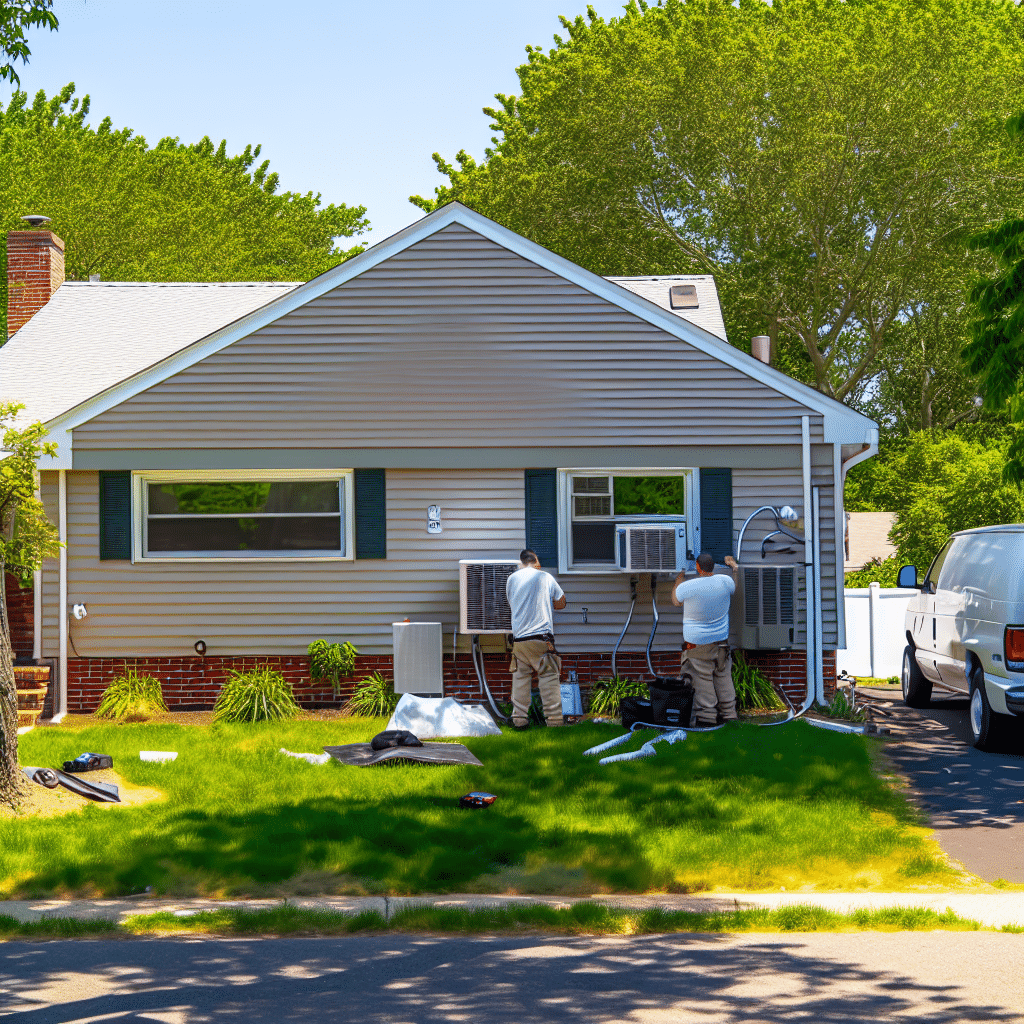Choosing the Right Size Air Conditioner
Nothing beats the feeling of walking into a cool, comfortable home on a hot summer day. But the key to this refreshing experience lies in one crucial decision: **what size air conditioner do I need?** It’s not just about immediate relief from the heat; it’s about making a smart choice that affects your comfort for many summers to come. The urgency to get it right cannot be overstated— especially as the summer heat approaches Cranston, RI.
In Cranston’s humid summers, the size of your air conditioner determines not only your home’s comfort level but also your monthly energy bills. The right AC size takes various factors into account, including the square footage of your home, ceiling heights, and even the size of your windows. It’s not a simple guessing game; accuracy here ensures that you avoid the pitfall of a system that’s too large and cycles on and off too frequently or one that’s too small and constantly strains to cool your home. The result should be a seamless transition from the oppressive outdoor heat to your serene indoor oasis.
However, the stakes are high, and making the wrong choice can cost you— in both comfort and cash. An oversized unit can lead to air that’s damp and not as cool as it should be, while an undersized system will run incessantly without ever really cooling down the room. Moreover, the importance of finding the right fit goes beyond personal comfort; it’s about choosing a sustainable option that conserves energy and keeps utility costs down. You deserve a home that is a haven from the heat, tailored to offer you relief as individual as your own living space. Remember, it’s not just about buying an air conditioner; it’s about investing in your home’s climate and future.
Understanding Air Conditioner Sizing
When delving into the nuts and bolts of air conditioner sizes, one term you’ll frequently encounter is **BTU**, or British Thermal Unit. This is the international standard for energy, and it’s pivotal in air conditioner sizing because it measures the amount of heat an AC unit can remove from a room each hour. To simplify, the larger your space, the higher the BTU rating you’ll need for efficient cooling. But it’s not just about room size; other factors such as sunlight exposure and average number of occupants can alter the BTU requirements for your air conditioner.
Beyond BTUs, other metrics also matter. The Energy Efficiency Ratio (EER) and Seasonal Energy Efficiency Ratio (SEER) ratings are indicators of an air conditioner’s efficiency, with higher values representing more cost-effective performance. Cranston, RI, homeowners would do well to consider air conditioners with a higher EER or SEER rating to enjoy long-term savings. It’s important to balance the initial purchase price against potential energy savings over the life of the unit. After all, an efficient AC is not just a tool for comfort; it’s an investment in your home’s sustainability.
Misconceptions abound when it comes to selecting air conditioners. Many believe that ‘bigger is better,’ but an oversized unit can lead to humidity issues and uneven cooling. Meanwhile, an undersized system will struggle to maintain a constant temperature and will likely incur higher electricity bills due to its non-stop operation. When considering the installation of an air conditioner, it is crucial to seek the advice of experts who can provide tailored recommendations for your specific situation. Only with an appropriately sized unit can you enjoy a comfortable, efficient home climate.
Frequently Asked Questions in Sizing AC Units
It’s natural to have questions when it comes to such an essential home investment. One common query is about the amount of area a standard 1-ton AC unit can cool effectively. While the rule of thumb is that a 1-ton unit can cool approximately 400 square feet, this can vary greatly based on ceiling height and insulation quality. Hence, it’s imperative to have a professional evaluate your space to determine the exact BTU requirement.
How does air conditioner size relate to high ceilings? The air in rooms with higher ceilings will take longer to cool because there is more volume to contend with. This is why special calculators are used to factor in ceiling height when determining the best size for your air conditioner. A knowledgeable contractor will consider this when calculating the necessary capacity for your specific Cranston, RI home.
Lastly, a frequently overlooked but critical aspect of air conditioner sizing is the quality of your home’s insulation. Good insulation retains cool air better, meaning that the air conditioner doesn’t need to operate as frequently. Therefore, it may be wise to assess and possibly upgrade your insulation before deciding on an air conditioning unit. This move can significantly impact both the size of the unit required and your energy savings over time.
Final Considerations for AC Size and Efficiency
As we wrap up our discussion, it’s clear that determining the right **air conditioner size** isn’t a decision to be taken lightly. It’s a balancing act between the dimensions of your space, the climate in Cranston, RI, and the specific characteristics of your home. Employing a strategic approach to your AC unit’s size can serve as a long-term advantage, cutting down on energy consumption while optimizing household comfort. This is an investment in your home’s future, one that merits thorough assessment and expert input.
Furthermore, the quality of your air conditioner plays a substantial role in your overall satisfaction. An air conditioning unit that’s properly sized and well-maintained doesn’t just cool your home; it promotes a consistent climate, reduces humidity, and operates quietly and efficiently. It’s essential to consider features such as programmable thermostats and variable speed fans, which can further enhance your comfort and save on energy costs. Remember, efficient performance is just as critical as the right size.
When selecting an air conditioner, it’s wise to partner with a reputable service provider. A trusted company not only assists in identifying the perfect AC model for your home but also provides dependable installation and maintenance services. For those residing in Cranston, RI, seeking local expertise can result in a tailor-made cooling solution that stands the test of time. If you’re contemplating a new installation or an upgrade, explore the possibilities with Rinaldi Roofing’s comprehensive cooling solutions tailored just for you.
Answering Your AC Sizing Questions
It is natural to ponder questions like the impact of an AC unit on energy bills or the difference in cooling capacities between portable and window units. These queries reflect the careful consideration homeowners put into their cooling choices. Being equipped with the right information can steer you away from common pitfalls and toward a decision that you can be content with, year after year. A well-chosen air conditioner is not a mere appliance; it’s a key component of your home’s overall wellbeing.
The significance of selecting the correct air conditioner size goes beyond the day-to-day comfort. It includes the peace of mind that comes with knowing you’ve made an economically sound choice—one that contributes to a greener planet by reducing energy wastage. It’s a complex equation, but you don’t have to solve it alone. With the right guidance from professionals, you can discover the ideal fit for your home’s specific cooling needs.
Ultimately, your goal is to create an environment that’s not just tolerable during hot weather, but truly livable. When the summer sun bears down, your home should be a sanctuary of cool and quiet—a space where you can relax, unwind, and escape the heat. Achieving this means finding a delicate harmony between appliance size and energy efficiency. We hope to have brought you closer to that goal, ensuring your summers are nothing but comfortable and enjoyable.
Insights From The Experts
Tip 1:
Consider the layout of your space before selecting an AC unit. Open floor plans might require a different approach to cooling compared to segmented areas, as air movement and distribution play key roles in efficiency.
Tip 2:
Keep in mind the local climate when determining AC size. An area with high humidity levels, for instance, will require a different calibration of cooling capacity to ensure comfort and prevent moisture-related issues.
Tip 3:
Regular maintenance can significantly extend the lifespan of your air conditioner. Ensure that filters are cleaned or changed regularly, and consider an annual checkup by a professional to keep your system running smoothly.
Tip 4:
Be attentive to the energy efficiency ratio (EER) or seasonal energy efficiency ratio (SEER) when choosing your air conditioner. Higher ratings not only lower utility bills but also reduce environmental impact.
Tip 5:
Don’t forget to consider the noise level of the air conditioning unit, especially for bedroom or office installations. A quieter system can make a significant difference in your comfort and concentration levels.
Expert Answers to Common AC Sizing Queries
How much square footage can a 1-ton AC unit cool effectively?
A 1-ton AC unit is generally capable of cooling 400 to 600 square feet efficiently. However, this can vary significantly based on factors like room insulation and the number of windows.
What are the considerations for AC unit size in high-ceiling rooms?
In rooms with high ceilings, more volume of air needs cooling, so you may need an AC unit with a higher capacity; a professional assessment is recommended to determine the exact requirements.
How does insulation affect air conditioner sizing?
Proper insulation reduces the load on your AC unit since it maintains the cool air inside, possibly allowing for a smaller unit to be efficient and cost-effective.
Can the size of your AC unit impact your energy bill?
Yes, a unit too large will cycle on and off frequently, wasting energy, while a too-small unit will work too hard to cool the space, also leading to higher energy bills.
What’s the difference between portable and window AC units in cooling capacity?
Portable AC units are typically best for cooling smaller spaces and are more flexible in location, whereas window units can offer more power and efficiency for larger areas.




